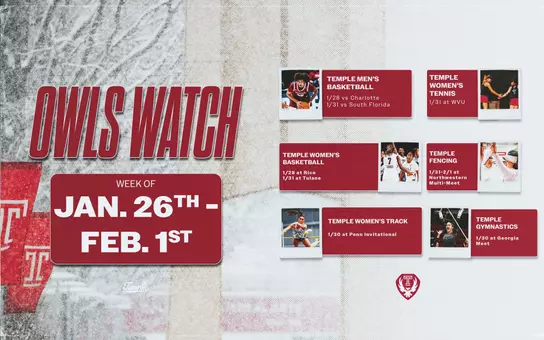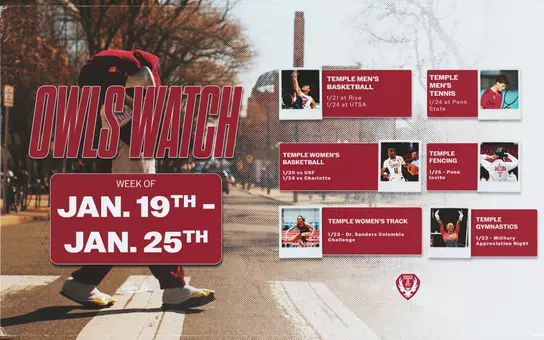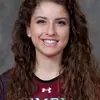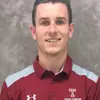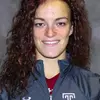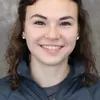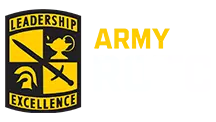Temple University Athletics
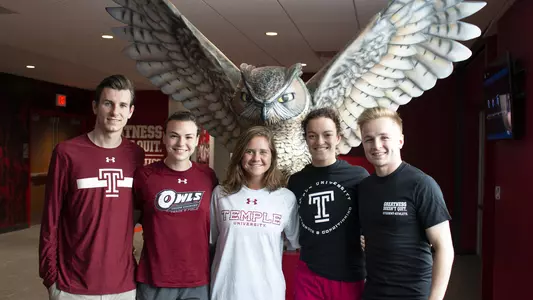
Photo by: Kim Silva
Temple SAAC Empowers Owl Student-Athletes
5.21.18 | General
How do we manage the time demands on student-athletes?
Is it fair that student-athletes have to sit out a year after transferring to another school?
These are tough issues that are being discussed by athletic administrators at the conference and NCAA level. But what about the student-athletes? What are their thoughts on these key issues?
This is where SAAC comes in. If you do not know SAAC, you should. It is the acronym for Student-Athlete Advisory Committee, an organization which is the voice of today's student-athletes.
"In this day and age we need to listen to our student-athletes," said Temple University Director of Athletics Dr. Patrick Kraft. "We discuss rules and regulations that have a direct effect on their lives in so many ways. They must have a seat at the table."
Kraft, who is starting his fourth year at the helm of Temple Athletics, truly practices what he preaches. An innovative leader who was honored in 2016 as one of the Sports Business Journal's Forty Under 40 recipients, he has instituted biweekly meetings with student-athletes and monthly breakfasts with the Executive Board of the Temple SAAC to ensure that he keeps his finger on the pulse of his student-athletes.
"The student-athlete experience is very important to me," he emphasized. "We have made great strides to enhance the quality of life of our student-athletes with facility upgrades, better travel and accommodations, more equipment and apparel, and staff additions including the first-ever full-time mental health professional.
We do not make these decisions in a vacuum. We listen to our student-athletes. Having regular meetings with our SAAC Executive Board empowers our student-athletes and provides them with a voice in the decision-making process."
Temple's SAAC truly is a representation of the University's 19 varsity sport programs. Run by an Executive Board comprised of five individuals – junior Hermann Doerner (men's soccer), redshirt sophomore David Fitzgerald (men's cross country), senior Kira Gensler (women's lacrosse), junior Ciara O'Sullivan (women's rowing) and senior Katie Pinson (women's cross country/track) – the committee includes two representatives from each sport.
Sitting in on a recent meeting showed the true sense of democracy in action. After the three E-Board representatives present, Doerner, Fitzgerald and Pinson, addressed the gathering of 30-plus members, the hour-long meeting which included pizza and soft drinks broke into three smaller groups. There they recapped past initiatives and discussed upcoming ones.
"The overarching goal is to better the student-athlete experience," said Pinson, who along with Fitzgerald is also a member of the American Athletic Conference SAAC. "We definitely try to make sure there is a community involvement aspect, because it is very important for us to foster relationships with our community. We also do events to foster relationships between sports as a lot of times we get caught up in our own sports. It is important to have other friends in other circles so that you have a diverse background."
"One of the greatest parts about being a member of SAAC is the creative problem-solving aspect," added Fitzgerald. "Student-athletes come to us with issues as small as something in their locker rooms to as big as a major piece of NCAA legislation that they want to address. So the next step is figuring out how to solve that and figuring out who to go to address it. Ultimately as representatives it is our job to go to people who can actually make the change whether it is through a rules perspective or facilitate something minor."
Kristy Bannon Sromovsky knows SAAC very well. As a student-athlete at Rosemont College she was a member of SAAC, and since her arrival at Temple in 2008, the former women's tennis player has been instrumental in working with and mentoring the Owls' program.
"I love working with all of our students," said Bannon Sromovsky, who currently serves as Temple's Senior Associate Athletic Director for Compliance and Student Affairs. "I was a student-athlete when I was in college and was fortunate enough to be a member of my campus SAAC. So for me it is really important to use what I learned as a student-athlete and what I have learned in my role here to help our student-athletes to grow and shape what they want this organization to be and what they want to accomplish with it."
Sromovsky and her staff are the main resource for SAAC at Temple, serving in the capacity as advisors to the organization. In her decade at the University she has watched SAAC grow to the point where it now manages 34 community service initiatives that encompass over 3,000 student-athlete hours.
Here is a sampling of community service events that Temple student-athletes have volunteered their time with this year.
One former Temple SAAC leader and current athletics department employee, Alyssa Drachslin, knows firsthand how empowering student-athletes can make a difference.
A four-year member of the Owls' volleyball team, Drachslin joined Temple's SAAC in the spring semester of her freshman year (2013). It was a life-altering decision that changed her outlook on college athletics.
Drachslin took to SAAC like a fish to water, and quickly became a leader. She served as the organization's president for three years and was one of Temple's two representatives on the American Athletic Conference SAAC Board. She then was named as the conference's NCAA representative, serving a two-year term on the 32-member national student-athlete SAAC Board.
"Before joining SAAC, I was not really aware of what the NCAA was (as an organization)," said the Riverside, Calif. native. "I did not know much about its membership and how decisions were made. So being brought into this process and suddenly being in a position where President (Mark) Emmert would come in and talk to us about various topics - topics and different legislative proposals in which we would debate amongst ourselves, sometimes for hours, was incredible."."
Drachslin, who earned two degrees from Temple, a bachelor of arts degree in political science ('15) and a master of science degree in globalization and development communication ('16), now is well-versed in the inner workings of both the NCAA and how SAAC interfaces with it.
"National SAAC will name a handful of initiatives which then are filtered down to the conference SAACs," she explained. "Conference SAAC then takes that information and is able to tailor it for each school in its own membership, while also taking from each school their opinions on various topics. These then are brought back up to national SAAC.
"I do think the NCAA listens to the student-athletes. The student-athlete body is such a huge population to represent that I think that National SAAC is something special where you have this select group of people who have been nominated/elected into this role. The NCAA wants to hear from the students. Now, whether they act on it is something different."
Initiatives talked about during Drachslin's two-year term (2015-17) on NCAA SAAC have been acted upon. The NCAA listened to concerns about the time demands on its student-athletes and enacted mandatory off days to address that concern. They also instituted a national "It's On Us" Campaign of which Temple was at the forefront.
"We did our own It's on Us video, submitted it to the NCAA and won the competition," Drachslin proudly boasted. "The NCAA also took a clip from the Temple video and included it in the national one."
That NCAA video ran as a commercial during the 2016 NCAA Men's and Women's Basketball Championships, and Drachslin was one of the student-athletes featured.
"My five minutes of fame," she said.
Drachslin, now in the newly created role within Temple's academic support area as the first Coordinator for Leadership and Professional Development, credits her return to the University to her time on SAAC.
"I attribute my current position (at Temple) to my national SAAC experience," she explained. "Being on National SAAC was a life-changing experience. The people I was able to meet and network with were incredible. I am grateful to have done it."
Empowering young voices. That is at the core of all educational institutions, and one that clearly is working within Temple Athletics and the NCAA through SAAC. Student-athletes not only know there leaders, but have a forum to provide input on decisions that affect their sport and their college experience.
"Temple does a good job in making sure that student-athletes are aware of what is going on and that they are comfortable speaking out," Drachslin stated. "Pat (Kraft) has his breakfasts with SAAC to make sure he is accessible in making decisions really based on the student-athletes."
"Open dialogue is the key to all communication," Kraft explained. "When I was a football player at Indiana University, SAAC did not have as prominent a voice as it has today. Student-athletes are the lifeblood of college athletics, so we must listen to them and make sure to include them in the decision-making process whenever possible."
Kraft does practice what he preaches as evidenced by the hiring of the department's first full-time mental health professional, Dr. Stephany Coakley in December 2017.
"At this summer's conference SAAC meetings we were talking about what we wanted to do this upcoming school year," said Fitzgerald. "Someone suggested mental health and the stigma associated with that. Everyone's heads kind of popped up. We said this is absolutely great. Everyone has been affected by it in some way and we decided that we wanted to end the stigma. People are able to go see an athletic trainer when they sprain their ankle. They can see a tutor when they are failing a class, but when they are having mental health issues all of a sudden there is this stigma to be embarrassed about it. We took a lot of pride in this initiative. We got professional athletes involved in it. We had all of the universities involved and it went really well.
"The mental health initiative was one of the first times that we really had all of our student-athletes at Temple interested in something. The administration heard us and hired a mental health professional. So this truly demonstrates that SAAC is making a difference, especially here at Temple."
 br />
br />
Is it fair that student-athletes have to sit out a year after transferring to another school?
These are tough issues that are being discussed by athletic administrators at the conference and NCAA level. But what about the student-athletes? What are their thoughts on these key issues?
This is where SAAC comes in. If you do not know SAAC, you should. It is the acronym for Student-Athlete Advisory Committee, an organization which is the voice of today's student-athletes.
"In this day and age we need to listen to our student-athletes," said Temple University Director of Athletics Dr. Patrick Kraft. "We discuss rules and regulations that have a direct effect on their lives in so many ways. They must have a seat at the table."
Kraft, who is starting his fourth year at the helm of Temple Athletics, truly practices what he preaches. An innovative leader who was honored in 2016 as one of the Sports Business Journal's Forty Under 40 recipients, he has instituted biweekly meetings with student-athletes and monthly breakfasts with the Executive Board of the Temple SAAC to ensure that he keeps his finger on the pulse of his student-athletes.
"The student-athlete experience is very important to me," he emphasized. "We have made great strides to enhance the quality of life of our student-athletes with facility upgrades, better travel and accommodations, more equipment and apparel, and staff additions including the first-ever full-time mental health professional.
We do not make these decisions in a vacuum. We listen to our student-athletes. Having regular meetings with our SAAC Executive Board empowers our student-athletes and provides them with a voice in the decision-making process."
_____________________________________________________________________________________
Temple's SAAC truly is a representation of the University's 19 varsity sport programs. Run by an Executive Board comprised of five individuals – junior Hermann Doerner (men's soccer), redshirt sophomore David Fitzgerald (men's cross country), senior Kira Gensler (women's lacrosse), junior Ciara O'Sullivan (women's rowing) and senior Katie Pinson (women's cross country/track) – the committee includes two representatives from each sport.
Sitting in on a recent meeting showed the true sense of democracy in action. After the three E-Board representatives present, Doerner, Fitzgerald and Pinson, addressed the gathering of 30-plus members, the hour-long meeting which included pizza and soft drinks broke into three smaller groups. There they recapped past initiatives and discussed upcoming ones.
"The overarching goal is to better the student-athlete experience," said Pinson, who along with Fitzgerald is also a member of the American Athletic Conference SAAC. "We definitely try to make sure there is a community involvement aspect, because it is very important for us to foster relationships with our community. We also do events to foster relationships between sports as a lot of times we get caught up in our own sports. It is important to have other friends in other circles so that you have a diverse background."
"One of the greatest parts about being a member of SAAC is the creative problem-solving aspect," added Fitzgerald. "Student-athletes come to us with issues as small as something in their locker rooms to as big as a major piece of NCAA legislation that they want to address. So the next step is figuring out how to solve that and figuring out who to go to address it. Ultimately as representatives it is our job to go to people who can actually make the change whether it is through a rules perspective or facilitate something minor."
Kristy Bannon Sromovsky knows SAAC very well. As a student-athlete at Rosemont College she was a member of SAAC, and since her arrival at Temple in 2008, the former women's tennis player has been instrumental in working with and mentoring the Owls' program.
"I love working with all of our students," said Bannon Sromovsky, who currently serves as Temple's Senior Associate Athletic Director for Compliance and Student Affairs. "I was a student-athlete when I was in college and was fortunate enough to be a member of my campus SAAC. So for me it is really important to use what I learned as a student-athlete and what I have learned in my role here to help our student-athletes to grow and shape what they want this organization to be and what they want to accomplish with it."
Sromovsky and her staff are the main resource for SAAC at Temple, serving in the capacity as advisors to the organization. In her decade at the University she has watched SAAC grow to the point where it now manages 34 community service initiatives that encompass over 3,000 student-athlete hours.
Here is a sampling of community service events that Temple student-athletes have volunteered their time with this year.
- Athletes Helping Athletes
- National Girls and Women in Sports Day Clinic
- Elementary School Readings
- Power Pong Tournament
- Flowers for Katie's Mom
- WalkTU
- Special Olympics Fall Festival
- Community Day Clinic
- Avenue of Treats
_____________________________________________________________________________________
One former Temple SAAC leader and current athletics department employee, Alyssa Drachslin, knows firsthand how empowering student-athletes can make a difference.
A four-year member of the Owls' volleyball team, Drachslin joined Temple's SAAC in the spring semester of her freshman year (2013). It was a life-altering decision that changed her outlook on college athletics.
Drachslin took to SAAC like a fish to water, and quickly became a leader. She served as the organization's president for three years and was one of Temple's two representatives on the American Athletic Conference SAAC Board. She then was named as the conference's NCAA representative, serving a two-year term on the 32-member national student-athlete SAAC Board.
"Before joining SAAC, I was not really aware of what the NCAA was (as an organization)," said the Riverside, Calif. native. "I did not know much about its membership and how decisions were made. So being brought into this process and suddenly being in a position where President (Mark) Emmert would come in and talk to us about various topics - topics and different legislative proposals in which we would debate amongst ourselves, sometimes for hours, was incredible."."
Drachslin, who earned two degrees from Temple, a bachelor of arts degree in political science ('15) and a master of science degree in globalization and development communication ('16), now is well-versed in the inner workings of both the NCAA and how SAAC interfaces with it.
"National SAAC will name a handful of initiatives which then are filtered down to the conference SAACs," she explained. "Conference SAAC then takes that information and is able to tailor it for each school in its own membership, while also taking from each school their opinions on various topics. These then are brought back up to national SAAC.
"I do think the NCAA listens to the student-athletes. The student-athlete body is such a huge population to represent that I think that National SAAC is something special where you have this select group of people who have been nominated/elected into this role. The NCAA wants to hear from the students. Now, whether they act on it is something different."
Initiatives talked about during Drachslin's two-year term (2015-17) on NCAA SAAC have been acted upon. The NCAA listened to concerns about the time demands on its student-athletes and enacted mandatory off days to address that concern. They also instituted a national "It's On Us" Campaign of which Temple was at the forefront.
"We did our own It's on Us video, submitted it to the NCAA and won the competition," Drachslin proudly boasted. "The NCAA also took a clip from the Temple video and included it in the national one."
That NCAA video ran as a commercial during the 2016 NCAA Men's and Women's Basketball Championships, and Drachslin was one of the student-athletes featured.
"My five minutes of fame," she said.
Drachslin, now in the newly created role within Temple's academic support area as the first Coordinator for Leadership and Professional Development, credits her return to the University to her time on SAAC.
"I attribute my current position (at Temple) to my national SAAC experience," she explained. "Being on National SAAC was a life-changing experience. The people I was able to meet and network with were incredible. I am grateful to have done it."
_____________________________________________________________________________________
Empowering young voices. That is at the core of all educational institutions, and one that clearly is working within Temple Athletics and the NCAA through SAAC. Student-athletes not only know there leaders, but have a forum to provide input on decisions that affect their sport and their college experience.
"Temple does a good job in making sure that student-athletes are aware of what is going on and that they are comfortable speaking out," Drachslin stated. "Pat (Kraft) has his breakfasts with SAAC to make sure he is accessible in making decisions really based on the student-athletes."
"Open dialogue is the key to all communication," Kraft explained. "When I was a football player at Indiana University, SAAC did not have as prominent a voice as it has today. Student-athletes are the lifeblood of college athletics, so we must listen to them and make sure to include them in the decision-making process whenever possible."
Kraft does practice what he preaches as evidenced by the hiring of the department's first full-time mental health professional, Dr. Stephany Coakley in December 2017.
"At this summer's conference SAAC meetings we were talking about what we wanted to do this upcoming school year," said Fitzgerald. "Someone suggested mental health and the stigma associated with that. Everyone's heads kind of popped up. We said this is absolutely great. Everyone has been affected by it in some way and we decided that we wanted to end the stigma. People are able to go see an athletic trainer when they sprain their ankle. They can see a tutor when they are failing a class, but when they are having mental health issues all of a sudden there is this stigma to be embarrassed about it. We took a lot of pride in this initiative. We got professional athletes involved in it. We had all of the universities involved and it went really well.
"The mental health initiative was one of the first times that we really had all of our student-athletes at Temple interested in something. The administration heard us and hired a mental health professional. So this truly demonstrates that SAAC is making a difference, especially here at Temple."

Players Mentioned
Ep. 34: Head Fencing Coach Jennie Salmon
Friday, January 30
MBB Press Conference vs. Charlotte (Adam Fisher)
Thursday, January 29
Ep. 33: Men's Basketball Senior Guard Jordan Mason
Tuesday, January 27
Temple Men's Basketball 2025-26 All Access | Game 19 & 20 At Rice & UTSA
Monday, January 26


